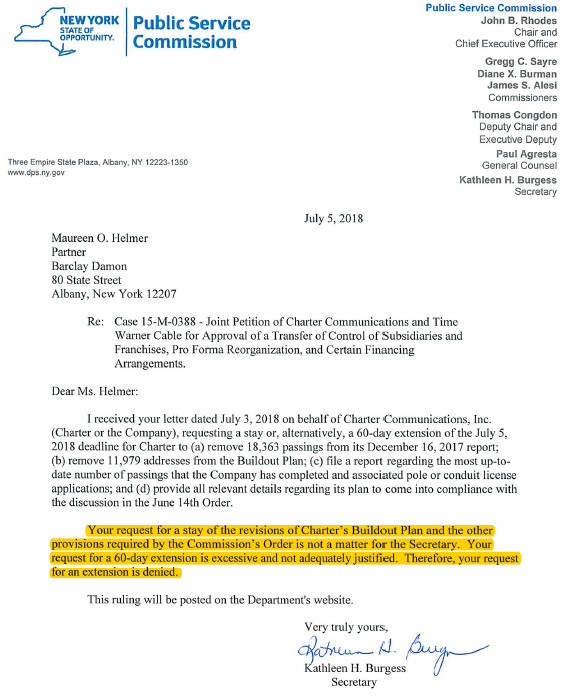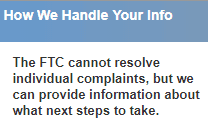 Whatever pleasantries were exchanged between Charter Communications and the New York Department of Public Service (Public Service Commission) earlier this year are now gone as the relationship between the cable company and state officials continues to deteriorate.
Whatever pleasantries were exchanged between Charter Communications and the New York Department of Public Service (Public Service Commission) earlier this year are now gone as the relationship between the cable company and state officials continues to deteriorate.
The first shot across the bow this summer came in Charter’s June 28th letter in response to a demand by the state to unconditionally accept the state’s terms of its 2016 Merger Order granting the acquisition of Time Warner Cable by Charter Communications. Except the cable company did not actually agree unconditionally to those terms. As part of a dispute over Charter’s fulfillment of its responsibilities in the Merger Order regarding rural broadband expansion, one section seemed to predict future litigation:
“While Charter’s acceptance of these commitments is unconditional, this acceptance remains subject to applicable law. Charter does not waive its positions as to the meaning or proper interpretation of its commitments (including Charter’s position that the negotiating history of Appendix A must guide such interpretation), or any of its legal rights including its right to seek review of the Commission’s June 14, 2018 Orders and the Commission’s interpretation and application of the January 8, 2016 Order.”
On July 3rd, Charter’s attorneys sent another letter to the telecommunications regulator doubling down on this language:
“Charter fundamentally disagrees that the Commission’s June 14th Order accurately reflects the agreement that was reached with Charter with respect to the Merger Order. The company intends to appeal the Order….”
That notification was included in a letter requesting an extension of the deadline to file a revised rural buildout plan to replace disqualified addresses with other New York addresses where broadband service is not currently available. Charter warned it would pursue “administrative and legal appeals” and did not want to take the time update its buildout lists until those challenges (and appeals) are exhausted. The company’s lawyers made sure to reserve all of Charter’s rights in an even lengthier footnoted disclaimer:
“Certain subjects discussed in this filing pertain to non jurisdictional products and services. Discussion of nonjurisdictional products and services is not intended as a waiver or concession of the Commission’s jurisdiction beyond the scope of Charter’s regulated telecommunications and cable video services. Charter respectfully reserves all rights relating to the inclusion of or reference to such information, including without limitation Charter’s legal and equitable rights relating to jurisdiction, compliance, filing, disclosure, relevancy, due process, review, and appeal. The inclusion of or reference to non jurisdictional information or to the ordering clauses or other requirements of the Order as obligations or commitments to provide non jurisdictional services shall not be construed as a waiver of any rights or objections otherwise available to Charter in this or any other proceeding, and may not be deemed an admission of relevancy, materiality, or admissibility generally. The requests discussed herein should not be construed in any way as a waiver by Charter of any of its legal rights, including (without limitation) Charter’s right to seek review of the June 14th Order or otherwise seek review of the Commission’s interpretation and application of its January 8, 2016 Merger Order.”
The key takeaway from this legal word salad is “non jurisdictional products and services” — code language from Charter to the state suggesting New York regulators have no legal authority to stand on imposing rules, regulations, and requirements on deregulated services like broadband. Charter’s lawyers defended the company against accusations it failed to meet the agreed-on schedule for rural broadband buildout to 145,000 unserved/underserved New Yorkers using similar language. Charter only began suggesting the state’s broadband expansion plan violated federal law after the state declared the company was out of compliance and fined.
Any legal action by Charter will likely rest on claims the federal government deregulated much of the cable business, including broadband service. Therefore, the state lacks enforcement power to compel Charter to offer broadband service to any unserved area, much less on a timetable. Remember, however, Charter was only too happy to agree to the terms of the merger agreement, with all its terms and conditions, to get the merger finished, without any complaints. Now it seems to have second thoughts.
“Charter finds that the task of revising the detailed Buildout Plan and the other requirements is far too large an undertaking to be accomplished with the necessary care and diligence required within the 21-day timeframe mandated in the Commission’s June 14th Order,” the cable company’s lawyers wrote, asking for an extension of the deadline.

Today, the Department issued a terse response to Charter’s legal team, authored by Kathleen Burgess, secretary of the Public Service Commission:
“Your request for a stay of the revisions of Charter’s Buildout Plan and the other provisions required by the Commission’s Order is not a matter for the Secretary. Your request for a 60-day extension is excessive and not adequately justified. Therefore, your request for an extension is denied.”
Two things seem clear: New York will continue to fine Charter for further missed deadlines, and it seems likely this matter is headed for court.


 Subscribe
Subscribe


 “Believe it or not, some of the biggest online games use very little data while you’re playing compared to streaming HD video or even high-fidelity audio,” the article stated. “Where streaming 4K video can use as much as 7 gigabytes per hour and high-quality audio streaming gets up to around 125 megabytes per hour, (but usually sits at around half that) certain online games use as little as 10MB per hour.”
“Believe it or not, some of the biggest online games use very little data while you’re playing compared to streaming HD video or even high-fidelity audio,” the article stated. “Where streaming 4K video can use as much as 7 gigabytes per hour and high-quality audio streaming gets up to around 125 megabytes per hour, (but usually sits at around half that) certain online games use as little as 10MB per hour.” The New York Public Service Commission has
The New York Public Service Commission has  Charter agreed to dramatically increase Standard internet speeds for its New York customers, first to 100 Mbps by the end of 2018 and again to 300 Mbps by the end of 2019. Charter met its first commitment ahead of schedule and is on track to again increase speeds for New York residents before the end of next year.
Charter agreed to dramatically increase Standard internet speeds for its New York customers, first to 100 Mbps by the end of 2018 and again to 300 Mbps by the end of 2019. Charter met its first commitment ahead of schedule and is on track to again increase speeds for New York residents before the end of next year. On May 9, 2018 the state discovered what that language discrepancy meant. Charter’s lawyers responded to the state’s charges that the company was not complying with the terms of the merger approval agreement with a classic “gotcha” letter, claiming Charter’s agreement provided only a “qualified” acceptance of language contained exclusively in Appendix A, and its obligations started and stopped there.
On May 9, 2018 the state discovered what that language discrepancy meant. Charter’s lawyers responded to the state’s charges that the company was not complying with the terms of the merger approval agreement with a classic “gotcha” letter, claiming Charter’s agreement provided only a “qualified” acceptance of language contained exclusively in Appendix A, and its obligations started and stopped there. In effect, Charter is ripping off the people of New York, and the state’s regulators are having none of it.
In effect, Charter is ripping off the people of New York, and the state’s regulators are having none of it.
 This morning, Pai
This morning, Pai 
 A well-coordinated campaign to manufacture news of a phony cyberattack and give false information to the press to explain why the FCC’s electronic comment system crashed while news of net neutrality went viral has been exposed.
A well-coordinated campaign to manufacture news of a phony cyberattack and give false information to the press to explain why the FCC’s electronic comment system crashed while news of net neutrality went viral has been exposed.
 When not on Twitter, staffers like Bray often serve as off-the-record sources for news services like FedScoop, while also feeding talking points and fake details about the cyberattack-that-wasn’t to the Wall Street Journal. The resulting article proved particularly useful to Bray and the FCC, which used the published news story as ‘independent evidence’ from ‘a third party’ that the attacks were real.
When not on Twitter, staffers like Bray often serve as off-the-record sources for news services like FedScoop, while also feeding talking points and fake details about the cyberattack-that-wasn’t to the Wall Street Journal. The resulting article proved particularly useful to Bray and the FCC, which used the published news story as ‘independent evidence’ from ‘a third party’ that the attacks were real.